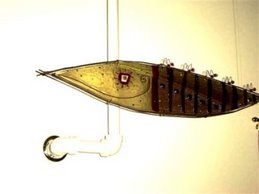Two other restaurant blog sites this week discuss pet peeves that customers have concerning behavior in the restaurant dining room, mostly, of course, by their waiter. NYT's Frank Bruni - who is one of my favorite restaurant bloggers (although I sure wouldn't want him coming in as a critic!) - writes this week about phrases that really jar his nerves. The other is Baltimore Sun critic Elizabeth Large, whose daily blog discusses mostly Baltimore City Restaurant activity. This week one of her topics was "The Worst Restaurant Mistakes". She's gotten a lot of responses, and the primary gripes concern service... Of course I share some of them, and I've shared them with you - the use of "guys" being one of the most difficult habits to get the staff to break. Clearing the table is a controversial issue - some people want their dirty plate cleared as soon as they are finished eating, regardless of how the others at their table are doing. Our policy is to wait until the entire table is ready, but hey, if you say "Take my Plate away please", of course Emily or Lindsey or who ever will do that for you. Mr. Bruni seems most upset with the overuse of "Enjoy"; of course I hear that alot in our dining room too and it can be overdone, but hopefully it is sincere. Some of the other complaints that have come up I think we have addressed: saying "I'll be right back with your change" is a lot better than asking "Do you need change?" and that is what we do here. One of my biggest peeves is the waiter saying "Is everything all right?" when they approach the table after serving the main course. I tell them to say "How is everything?", or, "Is there anything I can bring you?" since the first phrase seems to be indicating that something could be wrong, if only you knew what it was.
Overall though, some of the main points made by the various posters is the one I'd like to focus on - that attentiveness is the real issue, despite how it comes out of the mouths of the server. It's all about making eye contact, being available, and offering to "help", no matter how you phrase it. One person says he doesn't like someone to bring his entree while he is still "working" on his appetizer; another says he doesn't like it when the server asks him is he still "working" on that appetizer! How is the waiter to know who is who, who likes what. It becomes a no-win situation if you analyze it too much - clear the plate, don't clear the plate; announce "Enjoy!", say nothing; ask if you can bring change, bring the change they don't want without asking... The best piece of advice I feel I can give our young servers is to try to read the table, since every table, every customer is different and wants to be treated in a certain way. I tell them to make eye contact, figure out who the "host" is at the table, and deal with them. Know when a table wants to chit-chat, discuss the menu in depth, wants to know your opinion about everything, and know when they don't. The ones who don't are the ones who are more demanding, in some ways, because they are more difficult to read. Mostly it just takes experience, which new servers can only gain with time. Time and training. Training and nagging. Which is where I come in. When we hire a new person for the floor I always look them right in the eye and tell them that I am very particular and very difficult to work for and that I want things done my way. Because of this, of course, I have only myself to blame when things go wrong... Historically, servers who can't take this treatment quit. But that is not really a bad thing, because it leaves us with a crew that works well together, has a common goal, enjoys the challenge of the dining room. I believe that is where we are now at BT, or at least we are very close. It's taken five months to get here, but hopefully it will continue for years to come. And please, as customers, speak up - tell us what you want, what you like, what you don't like. How can we get better if we don't know what to do?
Overall though, some of the main points made by the various posters is the one I'd like to focus on - that attentiveness is the real issue, despite how it comes out of the mouths of the server. It's all about making eye contact, being available, and offering to "help", no matter how you phrase it. One person says he doesn't like someone to bring his entree while he is still "working" on his appetizer; another says he doesn't like it when the server asks him is he still "working" on that appetizer! How is the waiter to know who is who, who likes what. It becomes a no-win situation if you analyze it too much - clear the plate, don't clear the plate; announce "Enjoy!", say nothing; ask if you can bring change, bring the change they don't want without asking... The best piece of advice I feel I can give our young servers is to try to read the table, since every table, every customer is different and wants to be treated in a certain way. I tell them to make eye contact, figure out who the "host" is at the table, and deal with them. Know when a table wants to chit-chat, discuss the menu in depth, wants to know your opinion about everything, and know when they don't. The ones who don't are the ones who are more demanding, in some ways, because they are more difficult to read. Mostly it just takes experience, which new servers can only gain with time. Time and training. Training and nagging. Which is where I come in. When we hire a new person for the floor I always look them right in the eye and tell them that I am very particular and very difficult to work for and that I want things done my way. Because of this, of course, I have only myself to blame when things go wrong... Historically, servers who can't take this treatment quit. But that is not really a bad thing, because it leaves us with a crew that works well together, has a common goal, enjoys the challenge of the dining room. I believe that is where we are now at BT, or at least we are very close. It's taken five months to get here, but hopefully it will continue for years to come. And please, as customers, speak up - tell us what you want, what you like, what you don't like. How can we get better if we don't know what to do?



































































No comments:
Post a Comment